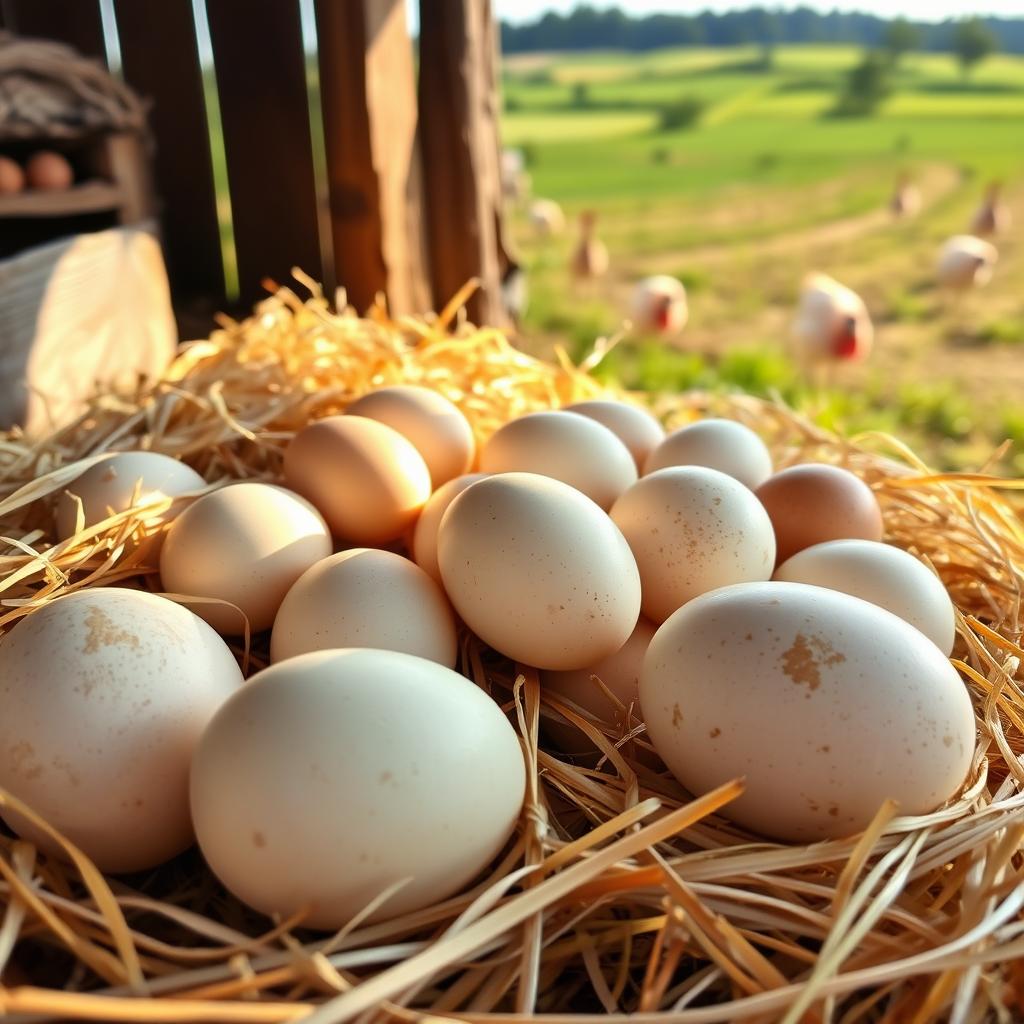Ever wondered about the difference between chicken and turkey eggs? I’m always eager to explore new foods, and turkey eggs caught my eye. Let’s discover the interesting facts and benefits of adding these eggs to your meals.

Turkey eggs have a special taste and lots of nutrients. They’re bigger and creamier than chicken eggs. If you love cooking or trying new foods, turkey eggs are worth checking out.
Table of Contents
Key Takeaways
- Turkey eggs offer a unique flavor and texture compared to chicken eggs.
- Turkey eggs are larger in size and contain more nutrients than chicken eggs.
- Incorporating turkey eggs into your diet can provide various health benefits.
- Understanding the production and availability of turkey eggs is crucial.
- Exploring the versatility of turkey eggs in the kitchen can open up new culinary possibilities.
Understanding Turkey Eggs: A Comprehensive Overview
Turkey eggs are a fascinating and often misunderstood delicacy. They have unique physical characteristics and culinary uses. Let’s explore the world of turkey eggs and learn the facts you need to know.
Physical Characteristics and Appearance
Turkey eggs are bigger than chicken eggs, with an oval shape. They come in white, tan, and speckled colors. Their shells are thicker, protecting the rich, golden yolks inside.
Common Misconceptions About Turkey Eggs
Many people think turkey eggs are hard to find. But, they are available from local farms, farmer’s markets, and some grocery stores. This makes them more accessible than you might think.
Comparison with Chicken Eggs
Turkey eggs taste richer and creamier than chicken eggs. This makes them perfect for baking and gourmet dishes. They also have a higher nutrient content, including vitamins, minerals, and proteins.
One turkey egg can be as big as two or three chicken eggs. This means they’re great for recipes needing more ingredients. They also offer more nutrients, making them a healthier choice.

“Turkey eggs are a delightful and nutritious addition to any kitchen, offering a unique flavor profile and culinary versatility that sets them apart from their chicken-laid counterparts.”
The Nutritional Value of Turkey Eggs
Turkey eggs are packed with benefits. They have high-quality protein, making them great for a balanced diet. A single turkey egg has about 13 grams of protein, helping build and repair body tissues.
But turkey eggs offer more than just protein. They are also full of vitamins and minerals like vitamin A, vitamin B12, iron, and selenium. These nutrients help keep your vision healthy, boost your immune system, and support red blood cell formation.
| Nutrient | Amount in Turkey Egg | Recommended Daily Intake |
|---|---|---|
| Protein | 13 grams | 46-56 grams |
| Vitamin A | 270 micrograms | 700-900 micrograms |
| Vitamin B12 | 1.1 micrograms | 2.4 micrograms |
| Iron | 2.4 milligrams | 8-18 milligrams |
| Selenium | 21.2 micrograms | 55 micrograms |
Turkey eggs have more nutrients than chicken eggs, making them a great choice. So, are turkey eggs good to eat? Yes! Adding them to your diet can be a tasty way to boost your health.

“Turkey eggs are a nutritional powerhouse, providing a wealth of essential vitamins, minerals, and high-quality protein to support a healthy lifestyle.”
Why Are Poultry eggs Not Commonly Sold in Stores?
Ever wondered why Poultry eggs are hard to find in stores? It’s because of the turkey egg industry’s challenges. These challenges make Poultry eggs less common than chicken eggs.
Production Challenges
Poultry eggs are harder to produce than chicken eggs. Turkeys lay fewer eggs, about 80-100 a year. Chickens lay 250-300 eggs annually. This makes Poultry eggs less efficient and expensive to produce.
Economic Factors
Producing Poultry eggs is also more costly. They need more food and special care. This increases the cost of raising turkeys, making Poultry eggs harder to sell.
Market Demand Analysis
There’s also a demand issue. Poultry eggs are mostly wanted by a few groups. This small demand makes it hard for producers to sell them widely.
But, some farms are trying to make Poultry eggs more available. As more people look for different food options, Poultry eggs might become easier to find.
Incubating and Hatching Poultry eggs Successfully
Incubating and hatching Poultry eggs is a rewarding but delicate task. It’s important to know the best conditions for incubation and hatching. By following these steps, you can welcome healthy turkey poults into the world.
Incubation Essentials
For successful incubation, the right temperature and humidity are key. Poultry eggs need a temperature of 99-101°F and humidity of 50-60%. It’s vital to monitor and adjust these levels for proper development.
Turning the eggs several times a day is also crucial. It mimics the mother turkey’s natural behavior and ensures even heat. Candling the eggs regularly helps monitor the embryo’s progress and spot any issues.
Hatching Time
As incubation nears its end, around 28 days, you’ll see the turkey poults pip. This means they’re starting to hatch. It’s important not to help them hatch, as they need to do it on their own for a strong start.
After the poults hatch, provide them with a warm, well-ventilated brooding area. Make sure they have food and water. With the right care, you can help these turkey babies through their first days.
“The key to hatching healthy turkey poults lies in meticulously managing the incubation environment. Attention to detail is paramount.”
Turkey Egg Production: From Farm to Table
The journey of Poultry eggs from the farm to your table is fascinating. It involves seasonal patterns, nesting conditions, and careful collection and storage. Knowing about turkey egg production gives us insight into this special agricultural work.
Seasonal Laying Patterns
Turkey hens lay eggs seasonally. In the U.S., the best time for turkey egg production is from March to June. April and May are the peak months. During this time, the hens look for nesting sites and start laying eggs.
Optimal Conditions for Laying
- Ample nesting space: Turkey hens like big, quiet spots for their turkey nests and eggs.
- Proper lighting: They need enough sunlight or artificial light to keep their egg-laying cycles.
- Comfortable temperature: Turkeys do best in temperatures between 60-80°F for steady egg production.
- Nutritious diet: A diet full of protein, vitamins, and minerals keeps the hens healthy and laying eggs well.
Collection and Storage Methods
Collecting and storing Poultry eggs needs careful attention. Farmers pick up the eggs several times a day. They make sure they are clean, uncracked, and cool. Keeping the eggs at the right temperature and humidity helps keep them fresh longer.
| Collection Frequency | Storage Temperature | Shelf Life |
|---|---|---|
| 2-3 times per day | 45-55°F | 4-6 weeks |
Understanding Poultry eggs production shows the hard work and care in bringing these special eggs to us. It’s a journey from the farm to your table.
Heritage and Wild Poultry eggs: What’s the Difference?
There are two main types of Poultry eggs: heritage and wild. Each has its own special traits. Knowing the differences can help you choose the right eggs for cooking or conservation.
Appearance and Flavor Profile
Heritage Poultry eggs are bigger and have a rounder shape. They have a thicker, chalkier shell. Their yolks are a deeper yellow, giving them a richer taste.
Wild Poultry eggs are smaller and more elongated. They have a thinner, smoother shell. Their yolks are paler, making them taste milder and more delicate.
Nutritional Differences
Both types of eggs are nutritious, but they differ. Heritage eggs have more fat and cholesterol, making them a treat. Wild Poultry eggs have less fat and cholesterol but still pack a lot of protein, vitamins, and minerals.
Conservation Efforts
Heritage turkey breeds were once at risk of disappearing. Now, efforts are being made to save them. Wild turkeys also face threats, like habitat loss and hunting. Buying heritage and wild Poultry eggs helps protect these birds.
Whether you’re a chef or a food lover, knowing about heritage and wild Poultry eggs is important. It helps you make better choices and appreciate the unique qualities of each type.
Best Practices for Raising Turkey Poults
Raising turkey poults needs careful attention and dedication. Whether you’re a hobbyist or a commercial turkey farmer, knowing the essential care, common challenges, and growth stages is key. This knowledge helps in raising healthy and thriving turkeys.
Essential Care Requirements
Creating the right environment is vital for turkey poults. They need a well-ventilated, temperature-controlled brooder. Also, they must have clean water and a balanced, high-protein diet. Keeping the area clean and limiting visitors helps prevent diseases.
Common Challenges and Solutions
- Poult Starvation: Ensure newly hatched poults have access to feed and water immediately to prevent starvation.
- Leg Deformities: Address any leg issues promptly, as they can impact the turkey’s growth and mobility.
- Cannibalism: Provide ample space, proper lighting, and enrichment to discourage this behavior.
Growth and Development Stages
Turkey poults go through several critical growth stages. In the first few weeks, they need close monitoring and specialized care. As they mature, their feeding and housing needs change. Knowing these stages helps you provide the best care for your turkeys.
| Stage | Age | Key Considerations |
|---|---|---|
| Hatchling | 0-4 weeks | Temperature, feed, and hydration are crucial during this delicate period. |
| Poult | 4-8 weeks | Gradual transition to higher-protein feed and larger living space. |
| Juvenile | 8-16 weeks | Focus on maintaining a balanced diet and preventing stress-induced behaviors. |
| Adult | 16+ weeks | Provide ample space, perches, and access to the outdoors as appropriate. |
Understanding the best practices for raising turkey poults ensures their health and well-being. Whether you’re a hobby farmer or a commercial producer, the right care and attention are crucial. With proper care, you can successfully guide your turkeys through their growth stages.
Cooking with Poultry eggs: Culinary Applications
Poultry eggs are a delightful and versatile ingredient in cooking. They are often overlooked compared to chicken eggs. But, they offer a unique flavor and a lot of turkey egg nutrition.
The are Poultry eggs good to eat? question is answered with a yes. Their creamy texture is perfect for omelets, frittatas, and quiches. Poultry eggs also add moisture and a savory taste to baked goods like cakes and cookies.
- Substitute Poultry eggs for chicken eggs in your favorite recipes, adjusting the quantity as needed to account for their larger size.
- Experiment with Poultry eggs in custards, crème brûlée, and other desserts that rely on a rich, custardy texture.
- Incorporate Poultry eggs into savory dishes like stir-fries, fried rice, or as a topping for salads and grain bowls.
Cooking with Poultry eggs opens up endless possibilities. They can add a unique twist to classic dishes or help you explore new recipes. These versatile ingredients will surely delight your taste buds and expand your cooking skills.
“Turkey eggs are a hidden gem in the world of cooking. Their rich, creamy texture and subtle flavor profile make them a versatile ingredient that can elevate any dish.”
Turkey Breeds and Their Egg-Laying Capabilities
The breed of turkey greatly affects how many Poultry eggs they lay. Some breeds are better at laying eggs than others. This makes them great for those who want lots of Poultry eggs.
Top Egg-Producing Turkey Breeds
The Bourbon Red and the Narragansett are top egg-layers. The Bourbon Red hens can lay up to 100 eggs a year. The Narragansett hens lay around 80 to 90 eggs each year.
Factors Affecting Egg Production
Many things can change how many eggs turkeys lay. Genetics, diet, and where they live are key. Good food, sunlight, and space help a lot. The age and health of the turkeys also matter.
Explore Related Recipes and Tips
To expand your knowledge of turkey eggs and other culinary delights, explore these related guides:
- Delicious Turkey Sausage Recipes for Healthy Meals: Perfect pairings with turkey eggs for a nutritious breakfast.
- How to Cook Tender and Flavorful Turkey Necks: Learn more about cooking with turkey products.
- Classic Italian Escarole and Beans Recipe: A perfect side dish to complement your turkey egg dishes.
FAQ
Are turkey eggs good to eat?
Yes, turkey eggs are safe and nutritious. They have more protein, vitamins, and minerals than chicken eggs. Their rich flavor and larger size make them great for cooking.
How do turkey eggs compare to chicken eggs?
Turkey eggs are bigger and taste creamier than chicken eggs. They also pack more nutrients per egg. While chicken eggs are common, turkey eggs offer a unique taste and health benefits.
Why are turkey eggs not commonly sold in stores?
Turkey eggs are less common in stores for a few reasons. Turkey hens lay fewer eggs than chickens, making it harder to produce them on a large scale. Also, there’s less demand for turkey eggs, and they cost more to make. This makes them less profitable for big stores.
How do you successfully incubate and hatch turkey eggs?
To hatch turkey eggs, keep the temperature at 99°F and humidity at 50-60%. Turn the eggs often to help them develop evenly. Watch the eggs closely and adjust the incubator as needed for a good hatch rate.
What are the differences between heritage and wild turkey eggs?
Heritage turkey eggs are bigger and have a richer taste than wild turkey eggs. Wild turkey eggs are smaller and have a thinner shell. Heritage turkeys are bred for egg production, while wild turkeys lay eggs for reproduction. Their nutritional content can also differ due to their diets and living conditions.
How can you successfully raise turkey poults?
Raising turkey poults needs careful attention to their needs. Keep the temperature right, provide a clean space, and feed them well. Watch for health issues and treat them quickly for a successful turkey-raising experience.


3 thoughts on “Turkey Eggs: Facts and Benefits”